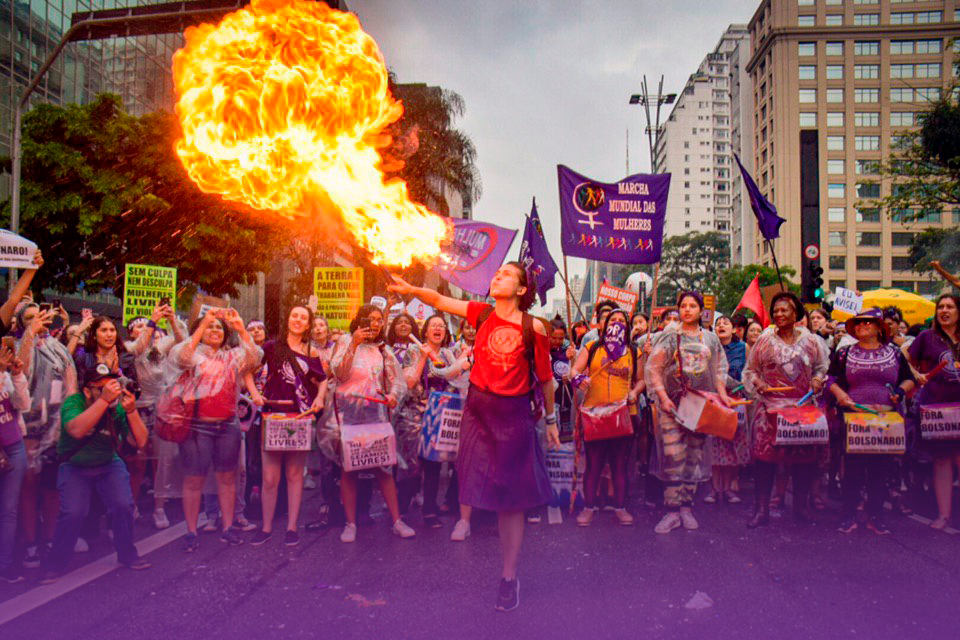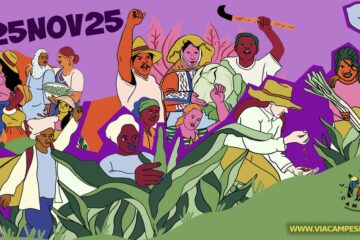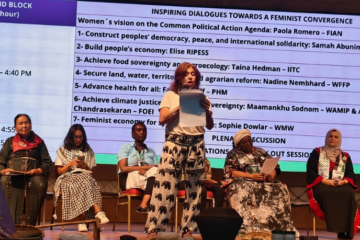The mobilizations around the world on March 8, International Day of Women’s Struggles, express the strength and power of feminism and are a striking mark of its reach as an emancipatory project.
This greatness leads us to acutely look at the reality experienced by us, women. On the one hand, we, as women, unmistakably sustain life through endless work as we conduct multiple simultaneous chores, marked by precariousness, racism, and persistent control and imposition. Women therefore make sure that life is cared for at home and in society at large, while also putting up resistance to the attack against their territories and the attempts to destroy their ways of living. All this work has an invisible dimension: women are ensuring the connections between people, times, generations, knowledge, affections.
On March 8, we express the history of denunciations, resistance, and building of answers by women. The violence perpetrated by the ruling system becomes increasingly outrageous and it cannot be described in one word—this is why we name this system as heteropatriarchal, capitalist, racist, colonialist, and LGBT-phobic.
In Brazil, we have made hope grow, and now we take steps toward changing the country. We are stronger to restore democracy, which we have always articulated with the struggle to smash neoliberalism and build a project for a grassroots and sovereign country. On this path, we have played a major role resisting the ultraright and defending a project change, expressed in our presence in grassroots struggles and in the ballot box, electing president Lula.
Anti-systemic Feminism
It is only through a systemic lens that we will be able to understand the conditions and dynamics experienced by women. Our bodies soften the impacts of the crisis, as we endure stress, tensions, and mental illness, in a dynamic of increasing precariousness of life where you work to live and live to work. It is a dynamic imposed by the market over our lives and bodies that leads to more violence, more femicide, more control, more discipline, racism, poverty, and inequality. To live a life free from violence and persecution, we need democracy, grassroots power, and values of liberation.
There will be no democracy as long as transnational corporations dictate how we should live, work, and handle our bodies and sexualities.
We, of the World March of Women, express this critique through several dimensions, including the medicalization and commodification promoted by transnational pharmaceutical companies, which reduce our bodies to reproduction and take away our autonomy. These struggles are not separated from one another—they are always connected and must be radicalized by anti-capitalist feminism.
We cannot eradicate poverty without ending exploitation. It is crucial to consider that exploitation happens distinctively through the sexual and racial division of labor. This imbrication leads to the concentration of Black women in informal work, domestic and cleaning jobs, sustaining a menial structure of a society in which part of the population refrains from being accountable for everyday life.
To change this model, we must consider the inter-relationship between production and reproduction of life, and therefore expose and acknowledge domestic and care work performed by women, which ensures production. Rendering it invisible is one of the primary mechanisms of capitalism to hide the economic nexus between these two spheres. Feminism has been exposing how the work of reproduction of life must be reorganized. This leads us to challenge the production model and conceive it based on the sustainability of life and nature. We must ask ourselves: what, how, and for whom to produce? The new model that we want to build must ensure the sustainability of life, putting good living on center stage.
Anti-racist and Feminist Equality
It is very important to go deeper into what should be our strategy to build equality. We cannot get caught in traps, in propositions that are limited to changes in the frameworks of the current model, to the acknowledgment and representation of women. Our view on equality between men and women also challenges the dimensions of race and class. It is problematic when analyses on inequality take as a starting point the indicators that reinforce or render natural the current dynamics of oppression and exploitation, disregarding the imbrications between gender, race, and class.
One example: how should we think about the feminist watchword acknowledged worldwide “equal pay for equal work” in the Brazilian reality? How is unequal pay organized here? The first matter is the allocation of women and Black people in precarious, underpaid work. At companies, workers doing “equal work” are officially hired for different positions, and that makes it hard for them to demand “equal pay.”
In Brazil, a decisive element for the pay gap is the country’s low minimum wage. A vigorous policy to increase the minimum wage is key to challenge inequality and as a redistributive measure in our country.
Autonomy Over Our Bodies, Self-determination Over Our Lives
Another emblematic topic to address is the autonomy over our bodies and the right to choose motherhood. In this sense, legalizing abortion as a right provided for free as a public service is fundamental. The feminist movement has historically demanded legal abortion as part of a broad policy to strengthen women’s autonomy, which requires health care across all needs and stages of life.
The big challenge right now is to face the attacks from the far right, which also negatively impacts women’s right to have their autonomy acknowledged in face of an unintended pregnancy.
This political and social setback has strengthened the view that motherhood defines women. Moreover, women are increasingly blamed and punitive practices coming from the same hypocrisy and misogyny that have been around for centuries have also increased. We have even witnessed institutions persecuting girls who became pregnant as a result of rape—and are entitled to the legal right to abortion.
A question must also be posed: why do so many women resort to abortion in Brazil? It is precisely because women don’t have their autonomy guaranteed to exercise their sexuality, due to patriarchal practices and the lack of appropriate access to contraception and control over their own bodies. The use of birth control still fails to hold men accountable, while women increasingly use hormonal methods that can lead to serious health issues and reinforce the control and profit of transnational pharmaceutical corporations. The number of abortions recorded in regions in the global North is significantly smaller than those recorded in regions in the global South. According to 2018 data, Latin America and the Caribbean are the regions with the largest number of abortions in the world.
Feminist Policies To Dismantle Patriarchal Structures
We cannot, however, present occasional, isolated demands. A set of policies are necessary today to change reality toward building full equality.
In this sense, equality and diversity policies must be implemented transversally across all spheres of society, thus fighting structural racism, sexism, and LGBT-phobia. Building equality for women across all their dimensions and diversity of class, race, and sexuality requires combined universal policies, with affirmative actions that disrupt the sexual and racial division of labor; socialize the domestic and care work; eradicate the causes of violence against women; and defend women’s autonomy over their bodies and sexuality.
Right now, it is important to take decisive steps to ensure equality-focused policies. The challenge is to build responses for our people’s effective needs: food, land, water, public services, the right to exist free from violence.
As neoliberal policies became stronger during the pandemic and have made life increasingly precarious, every emergency measure in effect, like [the conditional cash transfer program] Bolsa Família, is extremely necessary. But it is equally pressing to revoke the spending cap, increase the minimum wage, and ensure a number of changes in the economy to change the logic of the ruling market. Many are the pressing matters here: guarantee the lives of Indigenous peoples and Black people, end deforestation, implement land reform, decriminalize and legalize abortion, and many more. It is a pressing matter to guarantee the defense of our bodies, territories, and labor.
The political victory against neoliberalism and the far right was the result of a broad process of mobilization and building of unity with a broad front of movements and parties. We understand that only a process of grassroots participation that is deep rooted in all territories will garner the necessary power to effectively lead to this set of changes. This is why we are committed to building effective participation mechanisms so that the people can be the major actor in this process.
Our hope spreads as we look at Brazil’s role in the international scenario. We need a broad internationalist movement to advance toward the integration of the peoples, peace processes, and addressing the global systemic crisis, especially centering on climate justice.
On March 8, we will be out on the streets mobilizing for this grassroots, feminist, anti-racist project. To carry out this project, it must be indelibly anchored in grassroots struggles and organizations. This is why we will continue to march!

Nalu Faria is the coordinator of SOF—Sempreviva Feminist Organization [Sempreviva Organização Feminista] and a member of the International Committee of the World March of Women. This article was originally published on Brasil de Fato’s Sempreviva Column.




